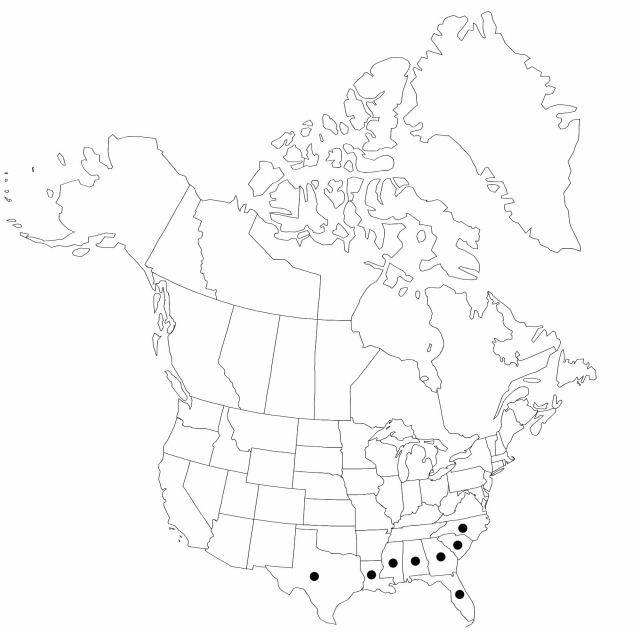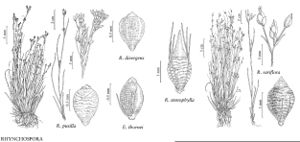Difference between revisions of "Rhynchospora pusilla"
Amer. J. Sci. Arts, ser. 2, 7: 409. 1849.
FNA>Volume Importer |
imported>Volume Importer |
||
| (3 intermediate revisions by 2 users not shown) | |||
| Line 6: | Line 6: | ||
|place=2, 7: 409. 1849 | |place=2, 7: 409. 1849 | ||
|year=1849 | |year=1849 | ||
| + | }} | ||
| + | |special_status={{Treatment/ID/Special_status | ||
| + | |code=F | ||
| + | |label=Illustrated | ||
}} | }} | ||
|basionyms= | |basionyms= | ||
| Line 11: | Line 15: | ||
|name=Phaeocephalum pusillum | |name=Phaeocephalum pusillum | ||
|authority=(Chapman ex M. A. Curtis) House | |authority=(Chapman ex M. A. Curtis) House | ||
| + | |rank=species | ||
}} {{Treatment/ID/Synonym | }} {{Treatment/ID/Synonym | ||
|name=Rhynchospora intermixta | |name=Rhynchospora intermixta | ||
|authority=C. Wright | |authority=C. Wright | ||
| + | |rank=species | ||
}} | }} | ||
|hierarchy=Cyperaceae;Rhynchospora;Rhynchospora pusilla | |hierarchy=Cyperaceae;Rhynchospora;Rhynchospora pusilla | ||
| Line 37: | Line 43: | ||
-->{{#Taxon: | -->{{#Taxon: | ||
name=Rhynchospora pusilla | name=Rhynchospora pusilla | ||
| − | |||
|authority=Chapman ex M. A. Curtis | |authority=Chapman ex M. A. Curtis | ||
|rank=species | |rank=species | ||
| Line 51: | Line 56: | ||
|publication title=Amer. J. Sci. Arts, ser. | |publication title=Amer. J. Sci. Arts, ser. | ||
|publication year=1849 | |publication year=1849 | ||
| − | |special status= | + | |special status=Illustrated |
| − | |source xml=https:// | + | |source xml=https://bitbucket.org/aafc-mbb/fna-data-curation/src/2e0870ddd59836b60bcf96646a41e87ea5a5943a/coarse_grained_fna_xml/V23/V23_382.xml |
|genus=Rhynchospora | |genus=Rhynchospora | ||
|species=Rhynchospora pusilla | |species=Rhynchospora pusilla | ||
Latest revision as of 20:40, 5 November 2020
Plants perennial, densely cespitose, 15–50(–60) cm; rhizomes absent. Culms erect or arching, leafy toward base, filiform, terete, wiry. Leaves overtopped by culm; blades linear to filiform, channeled, 0.3–0.5 mm wide, margins deeply involute, apex setaceous. Inflorescences: spikelet clusters 1–2(–3), dense to open, narrowly to broadly turbinate; branches capillary, variously elongate; leafy bracts setaceous, equaling or exceeding clusters. Spikelets variously brown, ellipsoid, 2–3 mm, apex sharply acute; fertile scales ovate to nearly orbiculate, rounded, 1.2–1.8 mm, apiculate, convexcupulate, midrib slender, mostly included. Flowers: perianth absent. Fruits 2–3 per spikelet, 0.7–0.9(–1) mm; body pale, obovoid-lenticular, (0.5–)0.6–0.9 × 0.4–0.5 mm, margin wirelike; surfaces transversely rugulose; tubercle buttonlike, depressed triangular, 0.05–0.1 mm, base lunate atop rounded fruit body.
Phenology: Fruiting summer–fall.
Habitat: Moist sands, peats and silts of low meadows, savannas, bogs, seeps, pond shores
Elevation: 0–300 m
Distribution

Ala., Fla., Ga., La., Miss., N.C., S.C., Tex., Mexico, West Indies, Central America.
Discussion
Selected References
None.
